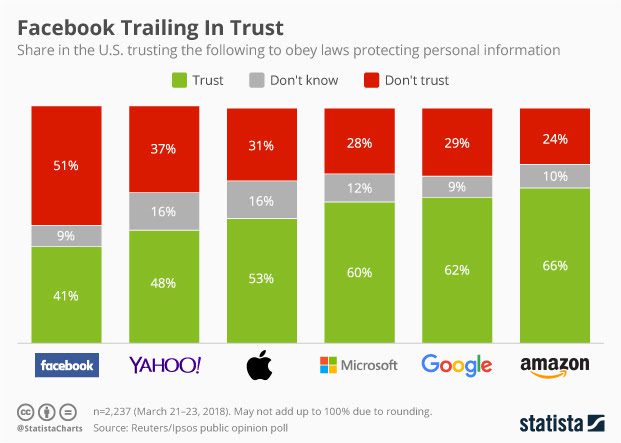What They’re Saying: The Facebook Fallout

It seems puzzling to say a company that is worth nearly half a trillion dollars is venturing somewhere near zero degrees Kelvin, but if you were only reading headlines this week you’d get the sense that Facebook isn’t looking so hot.
Since the break of the Cambridge Analytica scandal, the tech giant lost an estimated $100 billion USD in value, and its beleaguered founder Mark Zuckerberg lost an estimated $14 billion of his own worth. Fortunately for him, according to CNN, he’s still worth over $60 billion so he can easily afford more mayonnaise and butter sandwiches.
But the fallout is more than monetary. Trust in the social media company is at a critical low point, according to Statista data.

Janina Conboye at the Financial Times recently asked how the company may go about repairing its own image in “The MBA view: can Facebook fix its reputation?,” speaking with numerous business school faculty members, including London Business School‘s Jill Schlechtweg, who plainly says, “It is worth wondering whether Facebook can regain credibility at all. Arguably Mark Zuckerberg has evaded responsibility for the social costs of social media addiction, the proliferation of fake news, and now leaks of personal data for political ends.”
Check out how other business schools and industry experts are reacting the ongoing Facebook story below.
What @facebook knows about you apparently includes data about phone calls and messages. The revelation could make Facebook’s huge data scandal hurt more than ever. https://t.co/jActrbEB5i
— MIT Tech Review (@techreview) March 27, 2018
PSA: “Harvard Business School Prof. Shoshana Zuboff calls it “surveillance capitalism.” And as creepy as Facebook is turning out to be, the entire industry is far creepier. It has existed in secret far too long…” https://t.co/vSPlAyWnzu
— Mitchell Schneider (@Mitski) March 27, 2018
What Cambridge Analytica is accused of doing, Facebook and Silicon Valley giants like Google do every day, indeed, every minute we’re logged on. – https://t.co/8O9730vddo
— Mark Schaefer (@markwschaefer) March 29, 2018
In the wake of the Cambridge Analytica scandal, Apple is making their position clear on privacy. https://t.co/OLIl5ihtby
— FOX MBA & MS (@FoxMBA) March 28, 2018
.@profgalloway weighs in on #Facebook‘s handling of the Cambridge Analytica scandal via @barronsonline https://t.co/6zWqfAa3nk
— NYU Stern (@NYUStern) March 28, 2018
Rutgers Professors Talk Digital Era Work-Life Balance in New Book

In an era of constant contact, how can workers create a stable work-life balance? In a new book, two Rutgers Business School explore the dilemma.
La Salle School of Business Introduces New Online MBA

In October 2017, La Salle University’s School of Business will officially launch its new Online MBA program. The program is entirely virtual, so students can earn an MBA regardless of their physical location. Courses in the program last eight weeks, with five start dates to choose from each year. Students pursuing the Online MBA can choose from a variety of specializations, such as Business Systems and Analytics, Management, Marketing, Finance and Accounting.
Continue reading…
Finding the Best Toronto Executive MBA Programs

An MBA offers immeasurable help if you’re trying to climb the oft-mentioned corporate ladder. But what about getting right to the top? Executive MBA programs are tailor-made for reaching that higher-than-high career point, but how do you know which one may be right for you? We’ve outlined some of the best Toronto Executive MBA programs to help.
Rutgers Professor Unpacks Conflicting Globalization Views

Rutgers Business School recently explored the views of Management and Global Business Professor Farok J. Contractor, who unpacks the complex domestic and international impacts of globalization.
Hot MBA Jobs: Becoming A Healthcare Consultant

Consultants with MBA degrees are in high demand—and they’re often well compensated as a result. One of the fastest-growing industries for MBA Consultants is healthcare, thanks to a combination of a rising elderly population, affordable insurance (for now) and technological advancement. In an interview with U.S. News, Phil Miller, Assistant Dean of Carlson School of Management at the University of Minnesota, says, “A lot of consulting jobs have grown because a lot of firms need help in advising.” Recent UMN grads reportedly earn up to $150,000 without signing bonuses, according to the article. Let’s take a closer look at what becoming a Healthcare Consultant actually entails.
